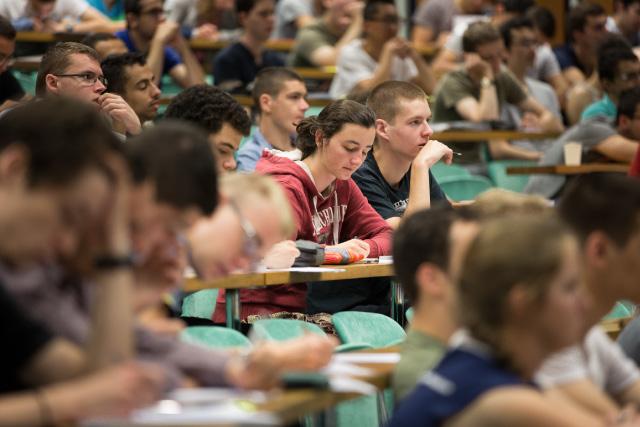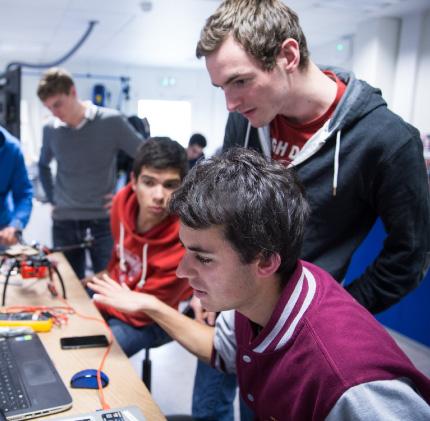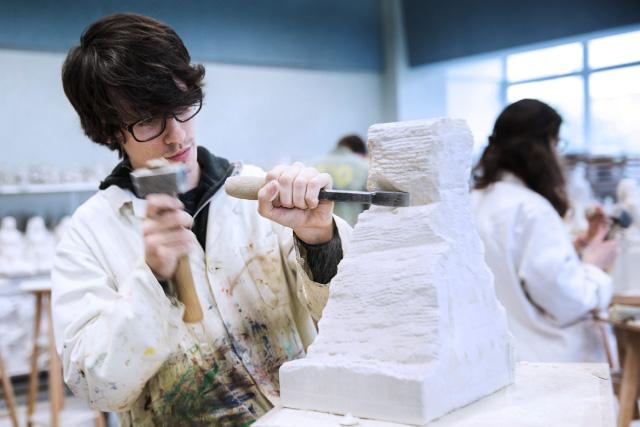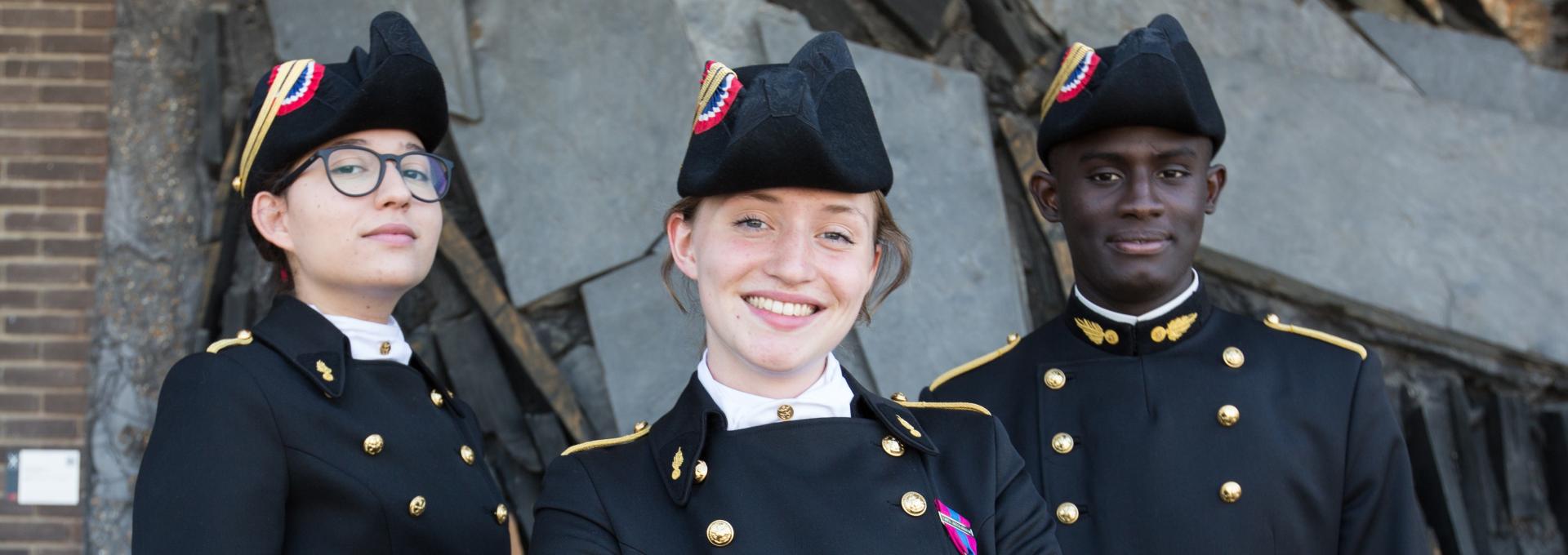For Year 2 of the Ingénieur Polytechnicien Program, each student must complete courses in at least 4 different subjects among the Year 2 courses offered by the Departments of Pure and Applied Mathematics, Physics, Chemistry, Biology, Mechanics, Economics, Computer Science, and Innovation Management and Entrepreneurship.
Each student is also required to select a practical Applied Laboratory Module (MODAL). A MODAL may only be chosen once and counts as an independent subject.

Differential Calculus and Holomorphic Functions *
This course provides fundamental instruction in mathematics, equipping students with tools used in applied mathematics, physics, mechanics, and economics. It prepares students for more advanced mathematics courses, particularly those in the specialization/Master 1 program.
Professor : Thomas Gauthier
Distribution, Fourier Analysis, and PDE (Partial Differential Equations) *
This course provides a basic training in analysis. This module allows mastering the mathematical tools used in applied mathematics, physics, mechanics, and economics. It paves the way for third-year mathematics specialization programs. The course introduces the formalism of distributions, introduced by Laurent Schwartz in the late 1940s, which provides a natural framework for the study of the Fourier transformation. It then focuses on studying the fundamental properties of the main partial differential equations of mathematical physics.
Professor: François Golse
Algebra and Galois Theory
The goal of this course is to firstly introduce the basics and tools of general algebra (groups, rings, algebra, quotients, field extensions, etc.) which will then make it possible to later develop the Galois theory and some of its more remarkable applications.
Professor: David HERNANDEZ
Functional analysis*
This course aims to provide the foundations of functional analysis, both upstream of applications to partial differential equations and upstream of applications to operator algebras. Considerations of topological group theory will also be taken into account. The course covers the analytical and geometric properties of Hilbert and Banach spaces and their generalizations, before applying them in measure theory, spectral theory, etc. Among the list of topics covered, here are some important concepts: convexity, fixed points, Haar measures, representations of compact groups, elliptic operators, embedding theorems between functional spaces.
Professor: Bertrand RÉMY
Advanced Quantum Physics
A reminder of the basic principles; evolution operator; approximation methods (variations, stationary perturbation, time-dependent perturbation); nuclear magnetic resonance; identical particles and the Pauli principle; angular momentum; hydrogen atom; addition of angular momenta; atoms and molecules.
Professors: Manuel Joffre, Landry Bretheau and Jean-Damien Pillet
Relativity and Variational Principles
Foundations of restricted relativity; Lorentz transformations and relativist optics; Minkowski space-time; Variational principles, Euler-Lagrange equations; Invariance and conservation laws, Relativistic Lagrangian theory, Relativistic mechanics; Relativity and electromagnetism; Hamiltonian mechanics and links with quantum mechanics; Introduction to general relativity.
Professors: Christoph KOPPER and Roland LEHOUCQ
Electromagnetism
Field-material interaction and application. Media, Materials and Structures; Energy, Power and Forces; Modes, Waves and Rays; Anisotropies and Nonlinearities; Antenna and oscillators; Metamaterials; Magnetism; Near fields.
Professors: Fabien BRETENAKER and Antoine BROWAEYS
Statistical Physics 1
Introductory course to the basic concepts of statistical physics. Basic principles of statistical physics; Boltzmann entropy and statistics; microcanonical, canonical and grand canonical ensembles; simple illustration: classical ideal gas. Quantum statistics: Bose-Einstein and Fermi-Dirac.
Professor: Gilles MONTAMBAUX
Molecular Biology and Genetic Information
This course allows students to discover a basic discipline and is recommended in order to pave the way to the other year 2 biology courses and the year 3 specialization programs offered by the department. It will reveal the logic of the workings of the living world and show how biology, a discipline which is currently growing rapidly, is developing more and more at the interface between physics, chemistry, computer science and engineering science.
Professor: Arnaud ECHARD
The Cell, A Living Unit
The cell is the structural and functional unit of all living organisms. The aim of this course is to describe the organization, functioning and dysfunctions of the cell. It introduces students to cellular biology, a central discipline of life sciences, at the interface between numerous other aspects of biology, but also between physics, chemistry, computer science and engineering science.
Professor: Sandrine ÉTIENNE-MANNEVILLE
Ecology and Biodiversity
The theories of biodiversity are at the interface between ecology and evolution. This course presents the processes involved in genesis and biodiversity maintenance. These processes are genetic, macroevolutionary and ecological. The concepts are addressed in the form of models which use the game theory, spatially structured models and population genetics and dynamics, but also using specific case studies.
Professor: Tatiana GIRAUD
Pathology and Therapeutic Strategies
This course illustrates some pathologies and the most current methods for their management. The selected pathologies are those that pose the greatest challenges for our developed societies. This biomedical course emphasizes the biological basis of pathologies and treatments and includes aspects of health economics.
Professor: Alexis Gautreau
Microeconomics
This course presents an introduction to the main notions and reasoning behind microeconomic analysis, i.e. analysis of the behavior of economic agents and their interactions on the markets and in organizations.
Professor: Marie-Laure ALLAIN et Pierre BOYER
Macroeconomics
This course covers a large number of traditional macroeconomics topics, while providing students with the basic tools to understand the world around them and to rigorously address the economic problems they may face.
Professor: Édouard CHALLE
International Economics
This course aims to provide students with a range of analytical tools for macroeconomics and international commerce. It presents fundamental theoretical models and pays specific attention to empirical analysis and the way in which the models reproduce data.
Professor: Enseignants: Grégory CORCOS et Isabelle MÉJEAN
Business Economics
Intended for students who want to familiarize themselves with economic issues and business problems, this business economics course aims, on the one hand, to provide the conceptual tools used to understand the macroeconomic trends that structure the world of business, and, on the other hand, business-related strategic analysis, financial and management operational tools.
Professor: Enseignant : Philippe TIBI
Statistics
This introductory course presents the notion of a statistical model and the basic principles and concepts of estimation and tests.
Enseignant : Eric MOULINES
Optimization and Control
This course serves as an introduction to optimization and control of dynamic models, which are essential tools for the design and proper functioning of systems stemming from science, technology, industry, and services.The first part of the course will focus on optimization, with or without constraints, in finite or infinite dimensions. After covering some theoretical aspects regarding optimality conditions and the existence of optima, emphasis will be placed on gradient-type numerical algorithms. Special attention will be given to significant problem classes such as linear programming and sequential quadratic programming.The second part of the course will study the control of differential equations modeling time-evolution problems. Concepts such as controllability, adjoint state, and Pontryaguine's minimum principle will be introduced.Beyond these technical aspects, the course also aims to illustrate the approach of applied mathematics, blending modeling, mathematical analysis, and numerical simulation, which are essential for any innovative process.
Enseignant : Grégoire ALLAIRE
Variational Analysis of Partial Differential Equations
This course covers partial differential equation-based models. Such models are found in multiple scientific and industrial fields such as solid and fluid mechanics, electromagnetism, climatology, blood flows, etc. The focus will be on how to use variational principles for theoretical resolution and for developing numerical solution methods.
Enseignant : François ALOUGES
Random Phenomena Modeling
Randomness plays a decisive role in multiple aspects of engineering science (telecommunications, shape recognition, network administration, etc.) and more generally economics, medicine, biology and physics. The purpose of this course is to formalize the notion of random dynamics and illustrate it through a variety of applications. We will describe two fundamental notions in probability theory: Markov chains and Martingales.
Enseignant : Thierry Bodineau
Introduction to Numerical Analysis: From Mathematical Foundations to Experimentation with Jupyter
This course offers an introduction to numerical analysis, starting from the mathematical foundations upon which numerical methods rely and extending to the implementation and utilization of these methods based on Jupyter notebooks, along with an understanding of their numerical efficiency. Connections are made with applications to understand the breadth of practical use of this type of method. Implementations of these methods in existing numerical libraries are also documented.
Enseignant : Marc Massot
Reactivity and Molecular Synthesis
This course covers molecular synthesis starting from basic reactivity concepts. Throughout the course, various interventions in the form of mini-lectures provide insights into various current aspects of research and industry in molecular chemistry.
Professor: Laurence GRIMAUD
Orbitals, Molecules, and Materials
The course aims to establish and reinforce the fundamental and rational bases of this discipline and to illustrate them with numerous applications, particularly in the field of energy. It is designed to address all interested students, without prerequisites. Students considering chemistry in their third year, and beyond, will find new fundamental concepts in this course essential for their further learning in molecular chemistry and materials chemistry. Other students will enrich their general and rigorous scientific culture, which can be highly useful for other disciplines such as biology or molecular physics.
Professors: Gilles FRISON and Narcis AVARVARI
Materials Chemistry
The course presents an introduction to polymers (syntheses and properties), illustrated by concrete examples of industrial polymers. It continues with an introduction to solid chemistry, notably oxides and their structural characterization, thus addressing the relationships between structure and properties, which play an essential role in the concrete applications of functional materials.
Professor: Thierry GACOIN, Guilhem DEZANNEAU et Laurent BOUTEILLER
Continuum Mechanics I
This course presents the fundamental concepts of the mechanics of deformable continua within the simplified framework of slender structures. The objective is to introduce all of the concepts into this restricted geometric framework in order to quickly move on to applications and address numerous phenomena with a simplified mathematical formalism.
Enseignant : Jean-Jacques MARIGO
Continuum Mechanics 2
The course presents the fundamental concepts of continuum mechanics in a general three-dimensional framework. It applies them to simple examples in fluid mechanics and solid mechanics.
Enseignant : Patrick LE TALLEC
Fluid Mechanics
The goal of this course is to provide students with a general solid foundation on the subject. The course starts by going over the different fluids, with regards to physics, thermodynamics and mechanics, then covers the different principles of continuum mechanics and finishes off with the fundamental equations of fluid mechanics: Navier-Stokes equations.
Enseignant : Laurent JACQUIN
Dynamics of the Atmosphere and Oceans
This course is an introduction to "geophysical fluid mechanics", i.e. the mechanics of the rotating and vertically stratified fluids which constitute the ocean and the atmosphere. It is an opportunity to study a large number of generic methods and processes found in the study of all other fluids. However, the main focus is on the role of the Coriolis forces and invariants associated with rotation (vorticity, potential vorticity, angular momentum) which primarily structure atmospheric and oceanic flows.
Enseignant : Hervé LE TREUT
Programing and Algorithm Basics
This course aims to take students from "Introduction to Computer Science" level to the end of the "Principles of Programing Languages" course level, so that they can go on to complete the École Polytechnique's computer science program. Teaching will mainly cover data structures (graphs, lists, stacks, lines, trees), algorithmics and a minimum of complexity theory.
Professor: Jean-Christophe FILLIÂTRE
Foundations of Computer Science: Logic, Models and Calculations
This course presents the foundations of computer science as a science. While the idea of using machines to perform calculations is an old one, it was only in the 1930s that the work of Alan Turing, Alonzo Church, Kurt Goedel and others laid the foundations for what would become computer science as we know it today.
Professor: Olivier BOURNEZ
Algorithm Design and Analysis
Algorithms are at the heart of all calculations. This course, drawing on the algorithmic foundations laid during the first computer science course, provides students with solid training in modern algorithmics.
During this course, students will gain in-depth knowledge of the main algorithms, understand how and why they function and be capable of reducing other calculation problems to these fundamental basics.
Professor: Benjamin DOERR
Algorithms for Data Analysis in C++
Modern data analysis relies on high-level languages like Python or R for data manipulation and processing. However, behind standard libraries like Scikit-Learn lie implementations in low-level languages like C or C++ for optimized execution and efficient management of memory or computation resources. Hence, the interest in this course, which has a dual objective: firstly, to familiarize students with some standard techniques of data analysis and machine learning; secondly, to acquire proficiency in C/C++ programming that eventually enables students to adapt existing low-level implementations to their specific needs. It is noteworthy that the programming paradigms covered in the course are almost exclusively sequential, with concurrent programming barely touched upon in the last session and reserved for other courses.
Professor: Steve OUDOT
3D Computer Graphics
In addition to its importance for digital entertainment (video games, special effects, 3D animation films), 3D computer graphics is essential for industrial virtual prototyping (design of objects or mechanisms intended for manufacturing), learning simulators, and other 'serious games', as well as scientific visualization, for example, for visual exploration of data or simulation results. This course presents the entirety of computer graphics, focusing on its interactive aspect. It covers in particular geometric modeling techniques, projective rendering, and the basics of 3D animation.
Professor: Marie-Paule Cani

The Group Science Project is carried out throughout Year 2. For half a day every week, all students of the Program, in groups of four or five, must identify and resolve a major problem, or work on designing and producing an innovative technology demonstrator. Students must independently apply, over a long period of time, one or more scientific disciplines and an appropriate method and organization.
The topics chosen by the students must present a relevant scientific and/or technological challenge. They may range from fundamental research to engineering, and relate to the in-depth study of a specific discipline, or to the implementation of knowledge derived from several disciplines. Subjects for the Group Science Project may be chosen in conjunction with one of the labs of École Polytechnique, a third-party research organization, a business or a state-owned company.
The Group Science Project involves people from Ecole Polytechnique, as well as its close partners, in particular the École Polytechnique Foundation.
Every year, students are given prizes for their Group Science Projects, awarded by Ecole Polytechnique or companies, or won in national or international competitions. A number of Group Science Projects per year also lead to the creation of start-ups.
The Group Science Project aims to:
- Allow students to complete specialized scientific work on their chosen project, using an approach that must be both creative and collective.
- Encourage group work and team spirit, over a long period, enabling students to gain fundamental organizational skills.
- Give students their first experience in project management.
- Promote collaboration between students and researchers.
Innovation Management and Entrepreneurship
During year 2, students attend a series of modules dedicated to the "Fundamentals of Organizations", during which they discover how companies operate (strategy, finance, organization, power, innovation, etc.). Each session is based on a business case analysis. Learn more
Humanities and Social Sciences
During the 1st semester, students take classes in:
Law, Economics and Political Science (examples: corporate law, communications and media).
Humanities (examples: political philosophy, history of religion).
Art (examples: art history, architecture, design).

During the 2nd semester, students take classes such as Art History and Business Process and Management, as well as seminars on various topics, including: Geopolitics and Strategy, Introduction to Psychoanalysis and Philosophies of the Far East.
In addition, students take courses in foreign languages and sports.
The Internship takes place at the end of Year 2, either in France or abroad, and lasts three months. It is mandatory and gives students the opportunity to observe operational and organizational procedures while acquiring valuable professional experience.
Workshops are also offered by the school's Career Assistance and Resource Center to help students with their internship choice, from filling out applications to career plan development.
Students also have the opportunity to complete their internship abroad with a foreign company for three months.

